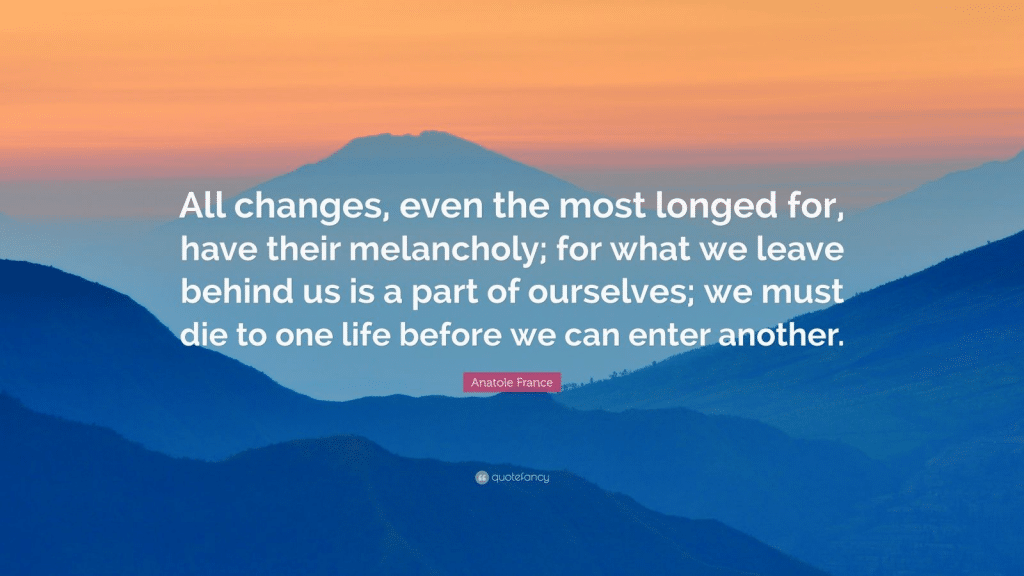It’s easy to see the benefit in making healthy changes in our lives.
More energy, better sleep, less pain with movement, clearer sense of purpose…for examples. What’s often harder is to look honestly at the reasons we choose to stay the same and not make any changes.
There are often important reasons to acknowledge for foregoing healthy changes in behavior and keeping the status quo.
- Change may bring discomfort, as well as increased wellbeing.
- Change may alter significant relationships, as well as improve relationships.
- Change may bring loss, not just gain.
- And we are rarely comfortable feeling the pain of loss…let alone talking about it.
Many of us are familiar with change implemented in our workplaces. It’s the new norm in our fast-paced modern world. One of the stages of moving through a change process is resistance….a significant period that can make or break how well someone moves through the process.
We resist healthy changes for many reasons – perhaps someone is telling us to change without asking for our input, it’s uncomfortable, it changes work relationships, it requires new learning & new habits, or we feel insecure about how well we can operate in the new system.
With individual behavior change, similar feelings might be at play as we make decisions to change our habits – even if we are the ones making the choice to change.
If we are feeling stuck and unable to move forward, it might be helpful to look at something called ‘decisional balance.’ This process assesses the pros & cons of making a change vs. keeping the status quo. As nurse coaches, this can be a very effective tool to use in coaching people who are caught in the tension between “I want to change” and “I’m stuck and don’t know why.”
The Healthy Changes questions to ask yourself are:
- What do I gain (benefit) from staying the same?
- What do I lose (cost) by staying the same?
- What do I lose (cost) by making healthy changes?
- What do I gain (benefit) by making healthy changes?
The benefits of healthy changes have to outweigh the costs if we are to commit to making healthy changes in our behavior.
Try this ‘healthy changes’ exercise:
- Bring to mind a change you’d like to make in your life in order to have greater sense of health or wellbeing.
- Take out a piece of paper (or laptop) and brainstorm answers to each of these (4) questions above. Be as honest as you can with yourself – that will best serve your process of exploration.
- After you’ve finished, ask yourself:
- Was there anything that surprised me here?
- Do the benefits of change outweigh the costs of change right now?
- Do I need to consider a different goal, or can I work with this one?
- Who can I share this with, in order to keep exploring the benefits and costs of making healthy changes in my life?
For most of us, it takes time before we are ready to commit to changing habits. We have to be ready to make changes, there needs to be a clear plan with specific action steps, and we are more likely to succeed if the benefits of change outweigh the costs.
This is one of the places where our skillset as nurse coaches can be valuable in supporting people to make change happen…and keep it real.
Change also involves loss and letting go, which we don’t often talk about. Yet it’s part of the dynamic in the ‘decisional balance’ tool.
What do I gain from keeping things as they are, and what do I lose by changing things?
Those beliefs often operate on a subconscious or unaware level, but can be powerful in either helping us or tripping us up.
Sometimes when we feel stuck in moving forward – even if we want to make healthy changes in our lives – it’s important to consider what are some of the consequences of making change. We may be holding on to the old, familiar habits because we don’t want to experience the loss involved in moving forward.
There’s pain involved in loss and letting go… even as there’s hope and relief. You may have a lot to gain by looking at hidden losses.
Jan has focused her nursing career of over 34 years on quality of life and wellbeing, primarily through the lens of end-of-life care and health promotion. Within end-of-life care, her past nursing work includes inpatient hospice, palliative care within a major medical center, employee health and wellness for a large hospice organization, and community end-of-life education. Her wellness focus included work as a health educator, wellness trainer, and in wellness program development. Her current work is as an Integrative Nurse Coach® around the practice of wellbeing in aging, illness, and dying -- supporting people in navigating serious illness, helping families to talk more openly about end-of-life priorities, and providing health coaching for both professional and personal/family caregivers.
Jan has served as faculty for the International Nurse Coach Association | Integrative Nurse Coach® Academy's Integrative Nurse Coach® Certificate Program (INCCP) since 2014, and continues as faculty with the new and innovative online INCCP. With other INCA colleagues, she helped create an End-of-Life Nurse Coaching program in collaboration with the New York Open Center; and co-created an advanced training program for nurse coaches called Coaching Conversations for People Living with Chronic & Advanced Illness.
Jan also serves as faculty for end-of-life coaching and doula programs with the Conscious Dying Institute, and enjoys presenting at workshops and conferences around the country. She self-published a book for nurses and nurse coaches called Re-imagining the End of Life: Self-Development and Reflective Practices for Nurse Coaches, which was honored with the American Journal of Nursing’s “Best Books of 2019” award in the categories of Professional Development and Palliative Care.
-
Janet Boothhttps://inursecoach.com/author/janet-booth/
-
Janet Boothhttps://inursecoach.com/author/janet-booth/






